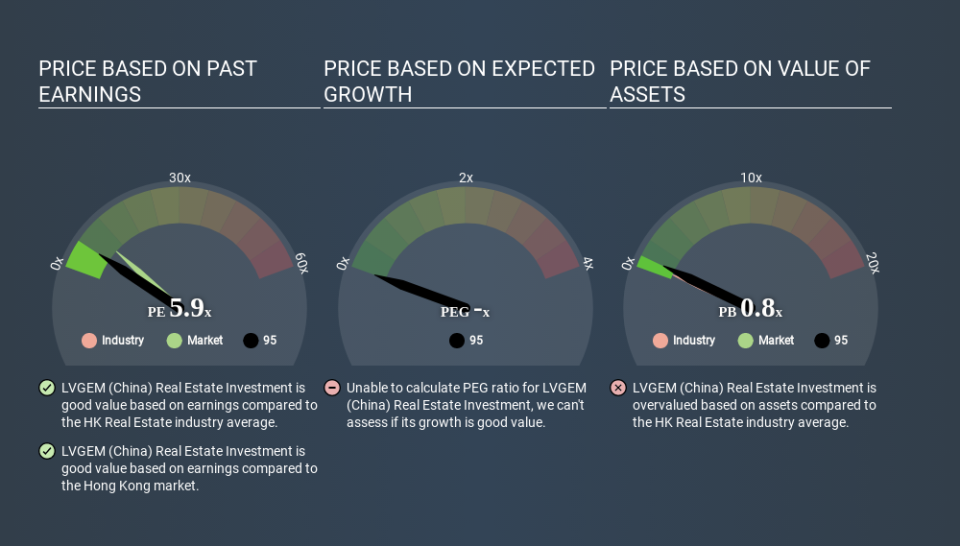Does LVGEM (China) Real Estate Investment Company Limited (HKG:95) Have A Good P/E Ratio?

This article is for investors who would like to improve their understanding of price to earnings ratios (P/E ratios). We'll show how you can use LVGEM (China) Real Estate Investment Company Limited's (HKG:95) P/E ratio to inform your assessment of the investment opportunity. LVGEM (China) Real Estate Investment has a P/E ratio of 5.92, based on the last twelve months. That means that at current prices, buyers pay HK$5.92 for every HK$1 in trailing yearly profits.
Check out our latest analysis for LVGEM (China) Real Estate Investment
How Do You Calculate LVGEM (China) Real Estate Investment's P/E Ratio?
The formula for P/E is:
Price to Earnings Ratio = Share Price (in reporting currency) ÷ Earnings per Share (EPS)
Or for LVGEM (China) Real Estate Investment:
P/E of 5.92 = CN¥2.080 ÷ CN¥0.351 (Based on the year to December 2019.)
(Note: the above calculation uses the share price in the reporting currency, namely CNY and the calculation results may not be precise due to rounding.)
Is A High Price-to-Earnings Ratio Good?
A higher P/E ratio implies that investors pay a higher price for the earning power of the business. All else being equal, it's better to pay a low price -- but as Warren Buffett said, 'It's far better to buy a wonderful company at a fair price than a fair company at a wonderful price'.
How Does LVGEM (China) Real Estate Investment's P/E Ratio Compare To Its Peers?
The P/E ratio indicates whether the market has higher or lower expectations of a company. You can see in the image below that the average P/E (6.0) for companies in the real estate industry is roughly the same as LVGEM (China) Real Estate Investment's P/E.
That indicates that the market expects LVGEM (China) Real Estate Investment will perform roughly in line with other companies in its industry. So if LVGEM (China) Real Estate Investment actually outperforms its peers going forward, that should be a positive for the share price. I would further inform my view by checking insider buying and selling., among other things.
How Growth Rates Impact P/E Ratios
P/E ratios primarily reflect market expectations around earnings growth rates. That's because companies that grow earnings per share quickly will rapidly increase the 'E' in the equation. Therefore, even if you pay a high multiple of earnings now, that multiple will become lower in the future. So while a stock may look expensive based on past earnings, it could be cheap based on future earnings.
LVGEM (China) Real Estate Investment increased earnings per share by a whopping 39% last year. And its annual EPS growth rate over 3 years is 27%. With that performance, I would expect it to have an above average P/E ratio. In contrast, EPS has decreased by 4.9%, annually, over 5 years.
Remember: P/E Ratios Don't Consider The Balance Sheet
Don't forget that the P/E ratio considers market capitalization. So it won't reflect the advantage of cash, or disadvantage of debt. The exact same company would hypothetically deserve a higher P/E ratio if it had a strong balance sheet, than if it had a weak one with lots of debt, because a cashed up company can spend on growth.
Such expenditure might be good or bad, in the long term, but the point here is that the balance sheet is not reflected by this ratio.
How Does LVGEM (China) Real Estate Investment's Debt Impact Its P/E Ratio?
LVGEM (China) Real Estate Investment's net debt is considerable, at 190% of its market cap. If you want to compare its P/E ratio to other companies, you must keep in mind that these debt levels would usually warrant a relatively low P/E.
The Bottom Line On LVGEM (China) Real Estate Investment's P/E Ratio
LVGEM (China) Real Estate Investment trades on a P/E ratio of 5.9, which is below the HK market average of 9.3. While the EPS growth last year was strong, the significant debt levels reduce the number of options available to management. If the company can continue to grow earnings, then the current P/E may be unjustifiably low.
When the market is wrong about a stock, it gives savvy investors an opportunity. If it is underestimating a company, investors can make money by buying and holding the shares until the market corrects itself. We don't have analyst forecasts, but you might want to assess this data-rich visualization of earnings, revenue and cash flow.
But note: LVGEM (China) Real Estate Investment may not be the best stock to buy. So take a peek at this free list of interesting companies with strong recent earnings growth (and a P/E ratio below 20).
Love or hate this article? Concerned about the content? Get in touch with us directly. Alternatively, email editorial-team@simplywallst.com.
This article by Simply Wall St is general in nature. It does not constitute a recommendation to buy or sell any stock, and does not take account of your objectives, or your financial situation. We aim to bring you long-term focused analysis driven by fundamental data. Note that our analysis may not factor in the latest price-sensitive company announcements or qualitative material. Simply Wall St has no position in any stocks mentioned. Thank you for reading.


